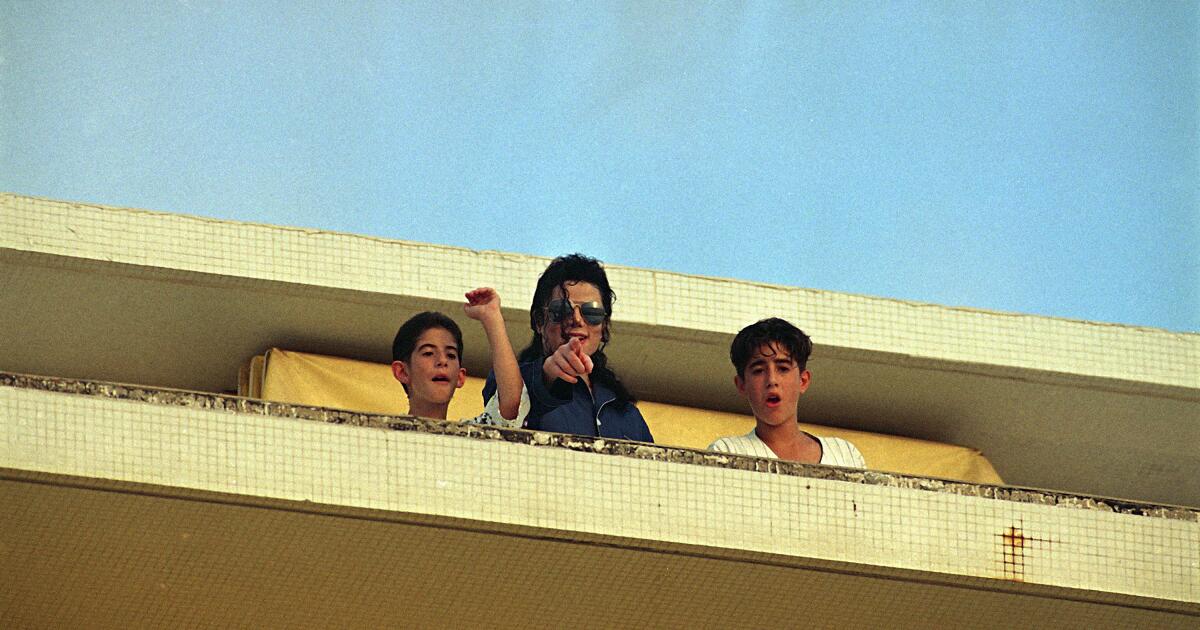Michael Jackson abused boy at homes of Elton John, Elizabeth Taylor, lawsuit says
Four siblings who were part of Michael Jackson’s secret “second family” have filed a lawsuit revealing the depths of the alleged sexual abuse they suffered as children, including claims that the singer molested one of the boys at the homes of Elton John and Elizabeth Taylor.
The lawsuit, filed against Jackson’s estate in California’s Central District Court on Friday, accuses the late singer of grooming, drugging, raping and sexually assaulting four of the Cascio children — Edward, Dominic, Marie-Nicole and Aldo — over the course of more than a decade, beginning when some of them were as young as 7. A fifth sibling, Frank Cascio, is not a plaintiff in the lawsuit.
The pop icon used code phrases such as “Can I have a meeting,” “Yogi Tea,” “Neverland,” and “Go to Disneyland” to encourage the children to engage in “extreme sex acts” with him, the suit alleges. He plied them with wine — “Jesus Juice” — and hard liquor — “Disney Juice “ — and used drugs to make them more compliant, according to the lawsuit.
The “Thriller” singer’s connection to the Cascio family began in the 1980s when he met their father, Dominic Cascio Sr., at a luxury hotel in New York where the father worked.
The lawsuit accuses Jackson of “insinuating himself” into the Cascio family by using “obsessive attention, lavish gifts, access to his celebrity lifestyle, and declarations that he loved and needed each of them.” He invited them to travel around the world with him and celebrated Thanksgiving, Christmas and his own birthday with them. He often spent long periods of time at their New Jersey home, where he also brought his own children, according to the complaint.
The chart-topping artist is accused of raping and molesting Edward “Eddie” Cascio at Elizabeth Taylor’s house in Switzerland as well as at Elton John’s home in the United Kingdom. Representatives for Jackson’s estate, Taylor’s estate and John did not immediately respond to a request for comment.
The complaint alleges that the late singer abused the four siblings at international and national tour stops as well as at his Santa Barbara County estate, Neverland Ranch. That property became a central focus of the 2019 documentary “Leaving Neverland,” in which two of Jackson’s accusers, Wade Robson and James Safechuck, detail the abuse they suffered as children.
The complaint states that Jackson’s staff would help conceal and normalize his abuse of the Cascios; employees would deliberately book the parents hotel rooms away from their children, the suit says, so they could not tell how much time Jackson was spending with them.
The entertainer showed the siblings pornography and photos of naked children to desensitize them, the complaint alleges. He told them that his life, their lives and that of their family members would be destroyed if people knew what was going on.
“He told them to stay away from therapists and to avoid women, who he told them were ‘evil,’ ‘sneaky,’ ‘liars,’ and could ‘smell’ if something sexual had happened,” the complaint states.
For decades after the initial 1993 sexual assault claim against Jackson surfaced, the Cascio family did not speak up against the singer.
The performer convinced the parents to withdraw Aldo Cascio and Marie-Nicole Cascio from school on two occasions to “prevent disclosure of the abuse and gain more access to them,” the complaint alleges. The second time was shortly after authorities raided Neverland Ranch in 2003.
The Cascios’ longtime relationship with the superstar became known to the public when they appeared on Oprah in 2010.
During the appearance, they were billed as Jackson’s secret “second family” and said that they were reluctant to come forward but wanted to “show the world who Michael really was.” At the time, the family said that the siblings were never abused and that they didn’t believe the accusations against Jackson.
As the four siblings aged and exposés such as “Leaving Neverland” came out, their statements about their childhood relationship with the pop star shifted. In 2019, several members of the Cascio family entered a confidential settlement agreement with Jackson’s estate agreeing to remain silent about their relationship to the singer.
That agreement provided for Jackson’s estate to pay each sibling five annual payments of about $690,000 as compensation “for the many years that Jackson abused each of them and that the Jackson Organization enabled and covered up the abuse,” according to the complaint. The Cascios say that this amount is “wholly inadequate,” noting that the singer reportedly paid $25 million in 1994 to settle the abuse allegations made against him in 1993.
Now, the four siblings are challenging the agreement as part of their recently filed lawsuit, alleging that they were coerced into signing it without understanding their rights.
“Buried within the Document’s legalese was a purported release of the Estate from liability for Jackson’s crimes, and language that prohibited Plaintiffs from reporting Jackson’s crimes to law enforcement or anyone saying anything negative about Jackson, or holding the Estate accountable in court for its and Jackson’s wrongdoing,” the complaint alleges.
Marty Singer, an attorney for Jackson’s estate, decried the lawsuit as “a desperate money grab” in a statement to People. A representative for Singer did not immediately respond to The Times’ request for comment.
“The family staunchly defended Michael Jackson for more than 25 years, attesting to his innocence of inappropriate conduct,” Singer told People. “This new court filing is a transparent forum-shopping tactic in their scheme to obtain hundreds of millions of dollars from Michael’s estate and companies.”
The four Cascio siblings are asking a jury to award them financial damages — including some potentially tripled damages because they were abused as children — over their allegations of sexual abuse and cover-up. They are also asking the court to throw out the 2019 agreement they say was used to silence them and are also seeking a ruling that the estate cannot force their claims into private arbitration.
